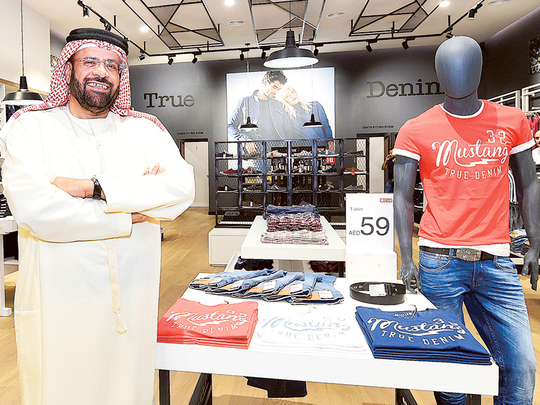
Dubai
UAE retail groups need to ensure they pick up the online rights as well as for the physical stores in any new franchise arrangements with global brands. Failing to do so could have consequences for the retailer, says a senior industry source.
“As franchise holders, they should be in a position to be in control of all aspects of that particular’s brand’s performance in these markets,” said Mohammad Al Madani, CEO of Al Madani Group, which recently picked up the rights for the Mustang denim brand from Germany. “Otherwise they will be left in a position where they put up sizeable investments on the brick-and-mortar presence and were then left vulnerable when the online sales of the brand is done by someone else or the brand-owner directly.
“This creates potential conflicts and need to be avoided. For the next generation of franchise opportunities, online and offline rights have to be integrated. And these have to be for the entire region.
“Brand principals have to made to realise that a win-win requires an equal partnership.”
Regarding online selling rights within these markets, it’s still a grey area for franchisees. Many of the original agreements governing brand-franchisee rights are confined to the physical stores. And brand owners, at least many of them, are still not too keen about offering both sets of rights to their regional partners.
This has been the stumbling block for many retailers to venture into the online space.
“Such deals may only be possible with newer franchise arrangements, not existing ones,” said a top official at one of the leading business groups in the country. “In many cases, the brand principal wants direct ownership of all their exposures in the e-commerce space. They may not be willing to cede that control on a region by region basis.”
The debate over online rights will continue awhile. There are more pressing matters at hand. The UAE’s retail sector is going through an acutely difficult phase.
Mall rents have remained stiflingly high, but sales have not been running in parallel. In fact, estimates are that the sector, especially in the fashion and apparel category, are down by as much as 10-15 per cent. And these are conservative estimates, at best.
But Al Madani believes the present market conditions can still be milked in the retailer’s favour. “For one, mall owners, especially those with new leasable areas, can become flexible in their rental expectations. And these are Grade A locations we are talking about, not below that. Retailers need to keep the negotiations last as long as possible.”
According to Al Madani, the craze for online buying is still confined to a few categories such as electronics and other gadgets. Apparel sales, in comparison, are still a long way off from realising their full online potential.
“Until they do, it’s mall locations that local retailers will be dependent upon for organic growth,” said Al Madani. “With newer brands coming in, they require three to five years to get their name recognitions. And that depends a lot on the locations, with prime locations aiding faster turnaround times.”
Having picked up Mustang, the Group is close to doing so for a couple of other West European apparel labels, one being a bridge brand and the other an entry level one. “The Mustang tie-up is a like-for-like replacement for the Levi’s denim label, the rights for which we had to sell back recently,” said Al Madani. “Levi’s wanted to deal with a single master-franchisee for the entire region ... and that was not something we wanted to get into. We were partners with Levi’s since 1997 and owned multiple brands in the UAE and some of the other Gulf markets. These assets were sold off and the relationship no longer exists.
“In the world of franchising, these things happen. But we have moved on.”












